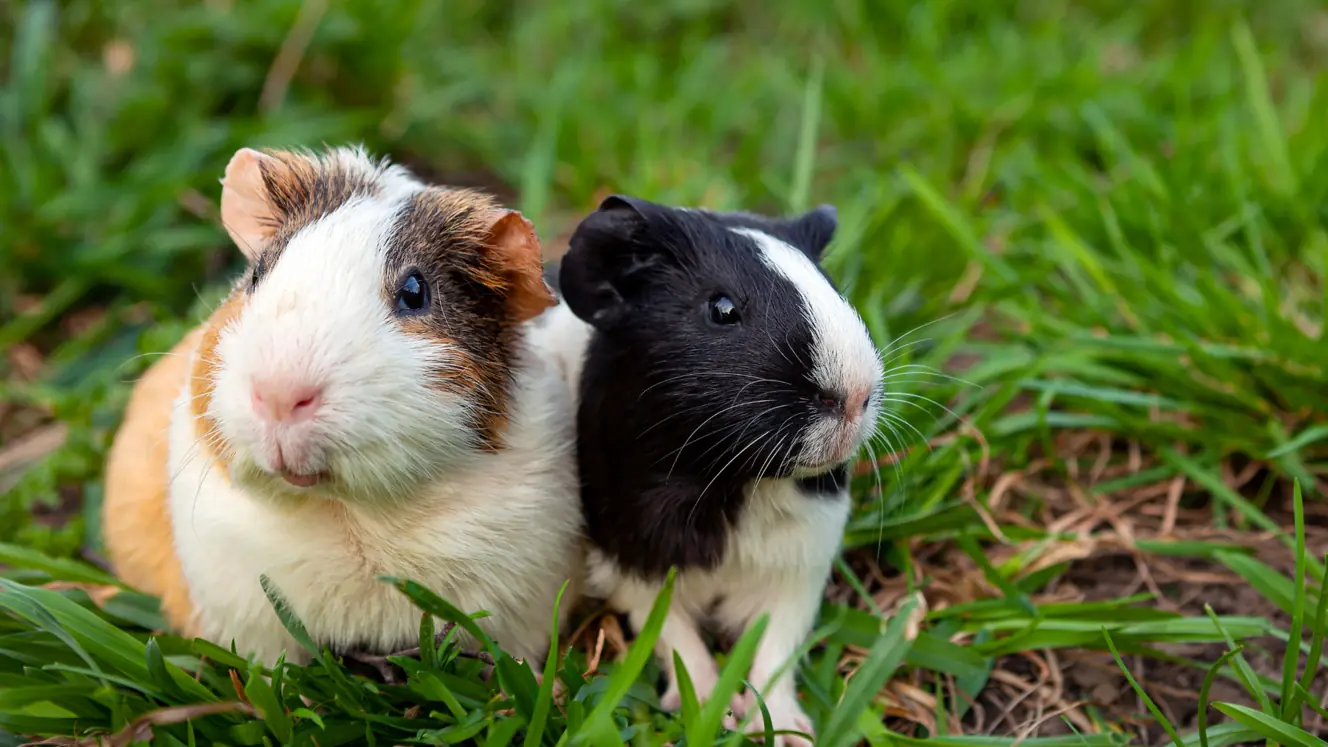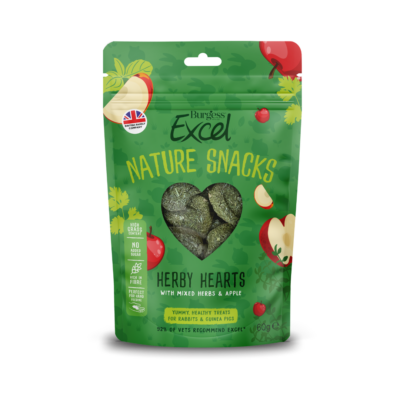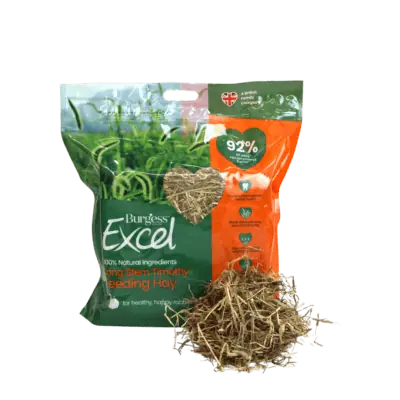
Spring couldn’t really have a better name. As the daylight stretches across the hours, green leaves unfurl from bare branches and birdsong pervades the early morning air, it’s no wonder we all get a spring in our step. The same is true for our pets too
Just like us, they’re eager for some fresh spring air and the chance to bask in the welcoming spring sunshine. However, if you’ve decided it’s time to let your small pets enjoy some outdoor time, there are precautions you need to take so it’s not a shock to their system.
Help your buns hop happily into spring
If you have kept your rabbits indoors for the winter or you have house bunnies, they wouldn’t have grown a thick winter coat as outdoor and wild rabbits do. This means that while you can let them outside on fine, sunny days, make sure they stay active to keep warm.
The RSCPA recommends waiting for temperatures to reach between 10-20°C before letting your indoor buns spend time outdoors. Providing lots of exciting tunnels, pipes, runs and a digging box will keep them busy, along with a cosy den to hop into for shelter.
Rabbits need time to adjust to changing temperatures
Veterinary charity PDSA advises: “Indoor rabbits will benefit from time outside so they can get some fresh air and enjoy some fresh grass. However, the sudden change in temperature when going from a warm house to a cold garden can come as a big surprise for them. Try to give them regular access to the outside as the seasons change so they have time to adjust. It’s also really important they have free access to get back indoors if they start to feel cold and lots of houses, hides or tunnels filled with hay so they can stay warm.”
Learn to spot the signs that your rabbits are feeling the cold
You can tell whether your rabbits are getting too cold by gently feeling their ears, which should be warm to the touch. Another sign that it’s too chilly for comfort is if your buns are sitting hunched up with their fur fluffed up.
SPRING SNACKS! Treat your buns with a delicious range of healthy treats >>
Know what your buns need as the seasons change
Rabbit Welfare has these top tips:
- Buns need to snuggle Rabbits should always have the company of at least one other rabbit, as long as they are compatible and neutered – sharing body heat is a vital way for rabbits to keep warm. They are also more likely to move around if they have a partner, which again will help generate body heat.
- Avoid extremes If your rabbits’ indoor area is very warm putting them straight out in the cold can cause them harm. Try to balance the temperature indoors and outdoors as much as possible, by keeping them in an unheated area such as a conservatory or hallway for example.
- Protect them from the elements When putting rabbits outside, put their run somewhere it is sheltered from the wind, and use a tarp to keep the rain off.
- Keep them safe Regardless of the temperature, rabbits must be safe from predators when they are outside, so make sure the run is strong and sturdy, including all doors, locks and catches. If you are allowing your rabbits ‘free running’ in all or part of a garden, then they must be supervised at all times.
- Give them a hidey-hole It’s nice for your rabbits to have a run on the grass but they will also need somewhere they can take a time out if they wish. Provide an enclosed space with two exits where they know they are safe.
Read our comprehensive guide to rabbit housing throughout the changing seasons >>
Gently does it with your guinea pigs
Guinea pigs can’t tolerate very cold or very hot weather and throughout the year need to be protected from draughts and temperature extremes.
The RSPCA advises that temperatures below 15°C can cause them to become chilled and above 26°C can cause heatstroke. Animal welfare charity Blue Cross recommends “Guinea pigs struggle with high and low temperatures, so wait until the weather is consistently warm to reintroduce them back outside.”
Chilly nights can be a problem for piggies
When moving your piggies back outdoors, ensure that their accommodation is well insulated and sheltered from the wind. Night-time can still be chilly in spring, so add extra insulation by covering the roof and exterior walls with a blanket or tarpaulin – ensuring that their enclosure is still well ventilated.
Blue Cross also suggest using pet-safe heating pads such as a SnuggleSafe if the mercury dips: “These will help to keep your guinea pig warm but make sure it has the cover on it and is buried under some bedding so that the heat isn't directly on their skin.”
SPRING SNACKS! Spoil your guinea pigs with a yummy range of healthy treats >>
An easy way to ensure your guinea pigs are warm and snug is to provide them with plenty of high-quality hay and paper bedding to snuggle into. A cosy sleeping box – which could be a cardboard box, or a wooden hidey house – with deep piles of hay inside will give your piggies an extra warm space to cuddle up in.
Create a cosy ‘home squeak home’ in your garden
For an ideal outdoor housing solution, a wooden Wendy House or garden shed makes a cosy home for your guinea pigs, especially if you have a group. Sheds can easily be converted with mesh doors and a step over barrier to stop them escaping. A shed offers more floor space for your guinea pigs and will enable you to socialise with your piggies, whatever the weather!
Find out more about adapting your guinea pigs’ housing to the changing seasons >>
Our 6 top tips to help your small pets enjoy happy spring days
- Ensure your small pets’ outdoor tunnels and runs are predator proof and provide plenty of space, shelter and shade.
- Provide plenty of safe places to hide so your pets have somewhere snug to go if they feel frightened by something.
- Add more high-quality hay or paper bedding into their sleeping areas if there are any unseasonal cold snaps. Don’t use fleeces or blankets – for constant chewers like rabbits and guinea pigs, this could cause an intestinal blockage.
- Make sure your pets have constant access to fresh water – bowls for bunnies (as lapping is the most natural way for them to drink) and sipper bottles for guinea pigs.
- Having a fluffy companion will help keep your pets warm and toasty. Rabbits and guinea pigs are both social animals, so should always be kept in suitable pairs or small groups of the same species. Never keep rabbits with guinea pigs. Guinea pigs have different dietary requirements to rabbits – and bunnies will often bully guinea pigs which can lead to injury. Rabbits can also carry diseases that are fatal to guinea pigs.
- Feeding only the best quality food will go a long way to helping your rabbits and guinea pigs stay in the best of health throughout the changing seasons. Plenty of high-quality feeding hay, grass-based nuggets for your piggies or buns and fresh greens will help your small pets maintain healthy skin, coat, eyes, teeth and digestion.
SERVE UP ONLY THE VERY BEST DINNER FOR YOUR SMALL PETS!
Our small pets deserve a high-quality diet that’s created just for them.
At Burgess, all our foods for small pets is made at our factory in the heart of Yorkshire, using only ingredients that meet our stringent specifications. With a long tradition of supporting British farmers, we actively source all our ingredients as close to our mill as possible and have launched many innovations.
These include the world’s first food specifically formulated for indoor rabbits andthe world’s first indoor guinea pig nuggets which are made with a calm formula. It’s no surprise that 92% of UK vets recommend our Burgess Excel small pets range!
- Along with their rabbit nuggets and a few healthy treats make sure your rabbits have unlimited access to good quality, dust extracted feeding hay and fresh grass to graze on. Check out our tasty nugget varieties specially created for junior and dwarf rabbits, indoor bunnies, golden oldies, adult rabbits – there’s even a light recipe for buns who are watching their weight!
- All Burgess Excel guinea pig nuggets, feeding hay and healthy treats are made with the finest ingredients that meet our stringent specifications and homegrown grass that’s exclusive to Burgess – no other pet food manufacturer has access to our grass!
PET TALK If you love animals and want the latest pet news, expert advice and top tips, head over to the
Are your small pets Burgess small pets? Join the Burgess Pet Club for exclusive offers and rewards.
- You can also sign up to the Excel Bunny Base – a safe Facebook community for rabbit guardians that are looking for advice and friendly discussions from likeminded owners – and there are lots of cute bunny photos and videos!
- Or why not join the Excel Squeak Squad on Facebook? Find advice and enjoy friendly discussions with likeminded guinea pig owners. You can also join Berry & Bramble, our special G-force guinea pigs, on weekly missions and fun competitions.
CARE MORE Find lots of useful advice on caring for all your pets from Burgess, the pet experts. Training, nutrition, grooming and general care. It’s all here >>
If you found this interesting, you may also like:
HOW TO RABBIT-PROOF YOUR GARDEN Letting your bunnies loose to explore and forage around your garden will be much appreciated by your nose-twitching pals. However, creating and maintaining a rabbit-safe garden is not an easy task and there are lots of things to think about.
SALAD DAYS Warmer weather means we’re all craving fresh summer salads – and we don’t want our small pets to feel left out. But what fresh foods are safe for our rabbits, guinea pigs, hamsters, gerbils, chinchillas and degus to eat? What foods are harmful and should be avoided at all costs?
WATCH OUT FOR THESE SPRINGTIME HAZARDS If you want to avoid a pet emergency this spring, it’s important to take a closer look at some springtime hazards (from Easter eggs and hot cross buns to toxic flowers and irritating insects) that vets would like pet owners to be aware of.
PLANTING FOR PETS This spring, why not add some pet-focused features to your garden?
FORAGING FOR YOUR SMALL FURRIES As well as high quality feeding hay and our specially formulated nuggets for rabbits, guinea pigs and chinchillas, you can help keep things interesting for your small pets by foraging for some tasty titbits yourself.
THE SECRET TO HEALTHY, HAPPY GUINEA PIGS Guinea pigs have long enjoyed the status of being one of the most popular pets – which is something they undeniably deserve. However, in order to help them live their best guinea pig lives, it helps to see things from their perspective.
BONDING WITH YOUR BUNNY CHUMS It’s no surprise that rabbits who bond with their owners live longer and happier lives. Whether your buns are already part of the family, or you’ve just welcomed some new rabbits into your family, find out how to deepen your connection with your nose-twitching pals.
ESSENTIAL HEALTH CHECKS FOR SMALL PETS Our small pets such as guinea pigs, chinchillas, rats, gerbils, hamsters and degus need us to keep a constant close eye on their health and wellbeing. But do you know what to look for?
RABBITS AND GUINEA PIGS – IS INDOORS OR OUTDOORS BEST? Is the outdoor life better for bunnies and guinea pigs, or will these small pets have a more enriching time if they’re kept indoors?
HOW DO YOU CREATE AN IDEAL HOME FOR YOUR INDOOR GUINEA PIGS? Traditionally thought of as outdoor pets, more and more people prefer to keep their guinea pig friends indoors – and there are lots of good reasons why. Yet, however cosy and stylish your indoor piggies’ home is, it also needs to meet all their health and wellbeing requirements.
HELP YOUR PETS GET INTO THE EXERCISE GROOVE Spring is traditionally the time of year when we’re all planning to eat more healthily and up our exercise levels – but what about our pets?
COST EFFECTIVE WAYS TO LOOK AFTER YOUR SMALL PETS How to create DIY boredom breakers and ways to upcycle old furniture and unwanted items from around the house into interesting features for your pets’ environment.
INDOOR GUINEA PIGS AND HOUSE BUNNIES Once traditionally always housed outdoors, many people enjoy keeping their guinea pigs or rabbits as indoor pets – and there are all sorts of reasons why.
HOW TO PROTECT YOUR GUINEAS AND BUNNIES FROM PESKY PARASITES When it comes to protecting our gorgeous small pets from mites, fleas, flies, ticks and mosquitoes – and any other irritating and unwelcome pests – a four-pronged attack is the best approach.
PROTECT AND PREVENT Raising awareness of the deadly Rabbit Viral Haemorrhagic Disease 2 (RVHD2), find out why all rabbit owners should ensure their pets are vaccinated against this and other fatal diseases.
FINDING A VET FOR YOUR SMALL PETS Did you know that just like hospital specialists, vets have different areas of expertise? That’s why, if you have small pets, it can be a good idea to seek out a vet that specialises in small animal medicine.

















